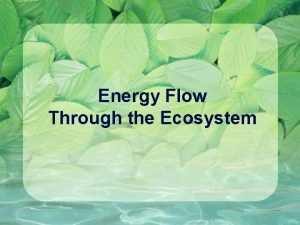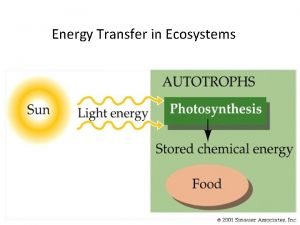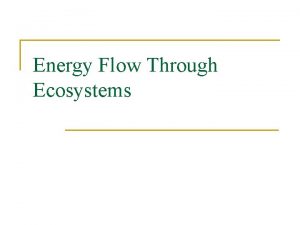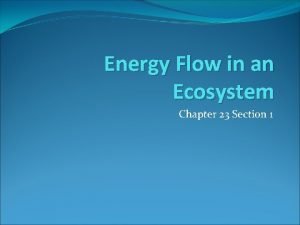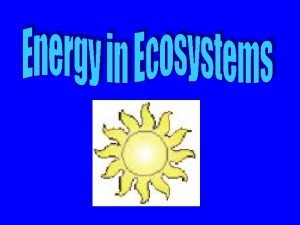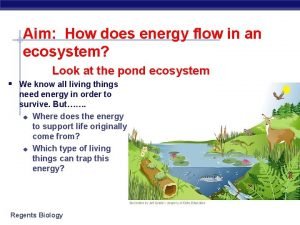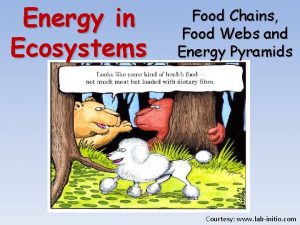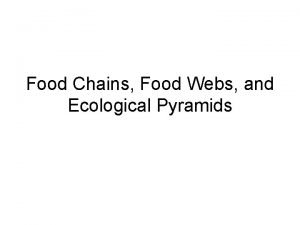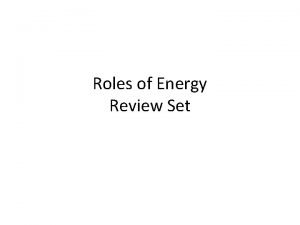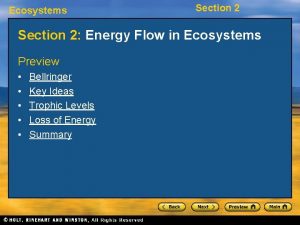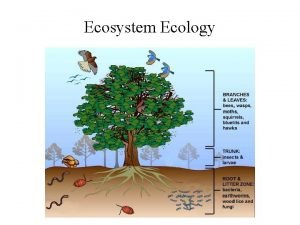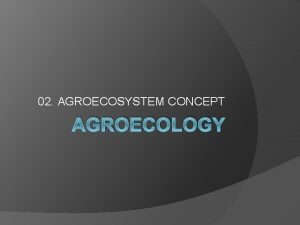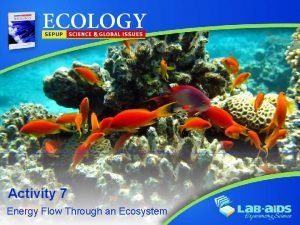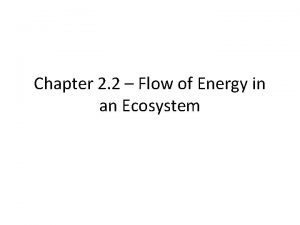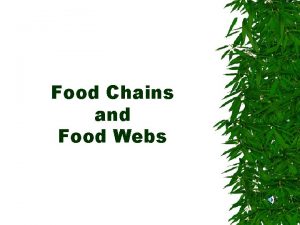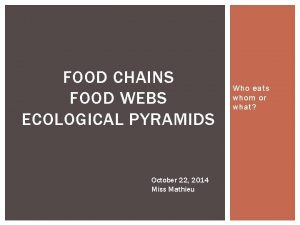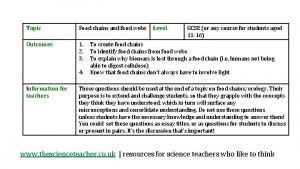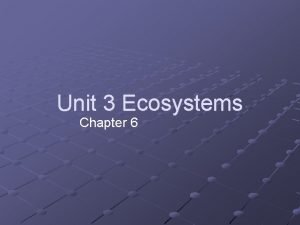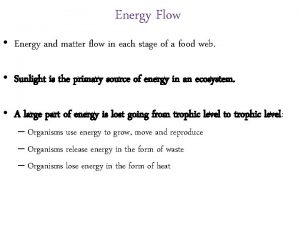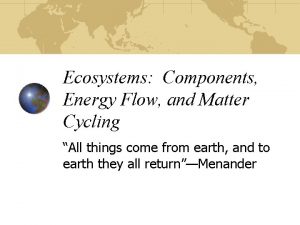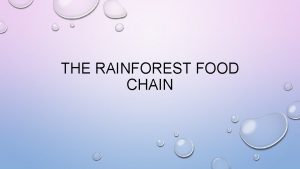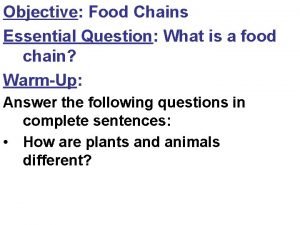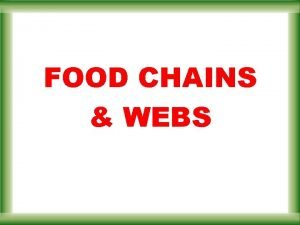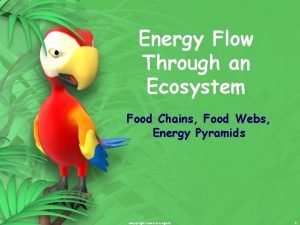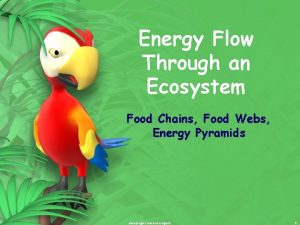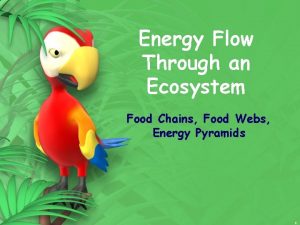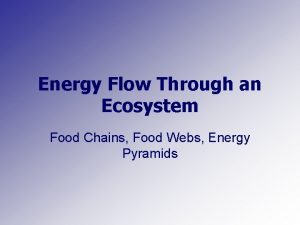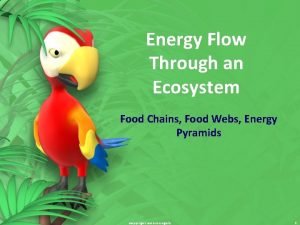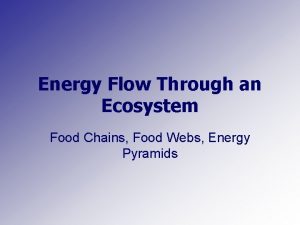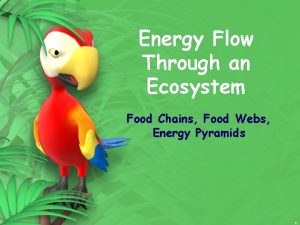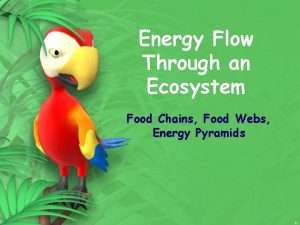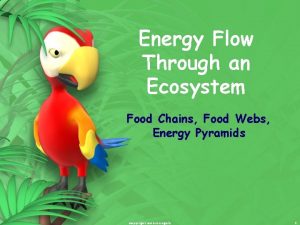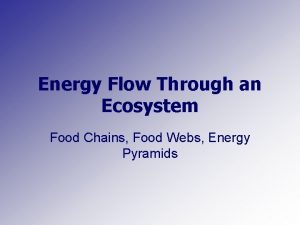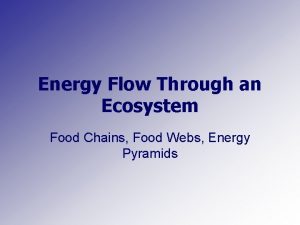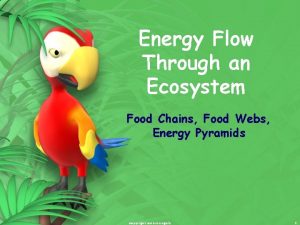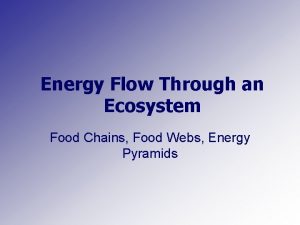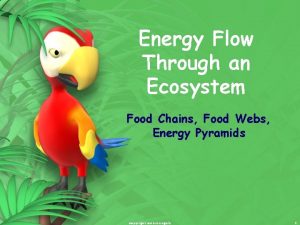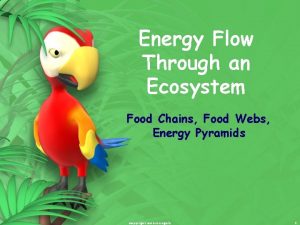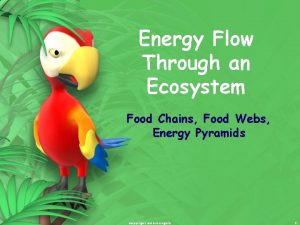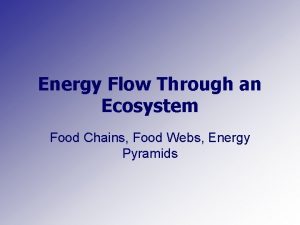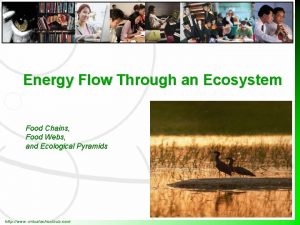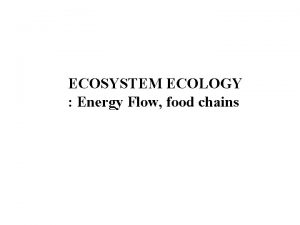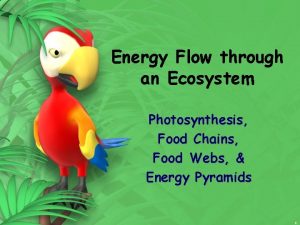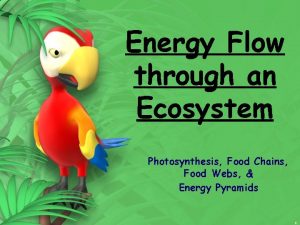Energy Flow Through an Ecosystem Food Chains Food































- Slides: 31

Energy Flow Through an Ecosystem Food Chains, Food Webs, Energy Pyramids copyright cmassengale 1

• Begins with the SUN • Through a process called Photosynthesis 6 CO 2 + 6 H 2 O + sunlight & chlorophyll C 6 H 12 O 6 + 6 O 2 copyright cmassengale 2

Photosynthesis • Chemical reaction where green plants use water & carbon dioxide to store the sun’s energy in glucose ENERGY is stored in glucose Glucose is stored as starch in plants • • copyright cmassengale 3

Organisms that can make glucose during photosynthesis are called PRODUCERS. copyright cmassengale 4

Producers use most of the energy they make for themselves. copyright cmassengale 5

Producers use cellular respiration to supply the energy they need to live. copyright cmassengale 6

6 O 2 + C 6 H 12 O 6 --> 6 H 2 O + 6 CO 2 + energy CELLULAR RESPIRATION is the chemical reaction that releases the energy in glucose. copyright cmassengale 7

The energy that is not used by producers can be passed on to organisms that cannot make their own energy. copyright cmassengale 8

Organisms that cannot make their own energy are called CONSUMERS. copyright cmassengale 9

Consumers that eat producers to get energy: • Are first order (1 ) or primary consumers • Are herbivores (plant-eaters) st copyright cmassengale 10

Most of the energy the primary consumer gets from the producer is used by the consumer. copyright cmassengale 11

Some of the energy moves into the atmosphere as heat. copyright cmassengale 12

Some energy in the primary consumer is STORED & not lost to the atmosphere or used by the consumer itself. This energy is available for another consumer (predator). copyright cmassengale 13

A Consumer that Eats Another Consumer for Energy: • Is called a secondary or 2 nd order consumer • May be a carnivore or a omnivore • May be a predator • May be a scavenger copyright cmassengale 14

Most of the energy the secondary consumer gets from the primary consumer is used by the secondary consumer. copyright cmassengale 15

Some of the energy is lost as heat, but some energy is stored and can passed on to another consumer. copyright cmassengale 16

A consumer that eats a consumer that already ate a consumer: • Is called a 3 rd order or tertiary consumer • May be a carnivore or a omnivore • May be a predator • May be a scavenger copyright cmassengale 17

Consumers that eat producers & other consumers Are called omnivores Omnivores eat plants and animals copyright cmassengale 18

Consumers that hunt & kill other consumers are called predators. The animals that are hunted & killed are called prey. copyright cmassengale 19

Consumers that eat other dead consumers are called scavengers copyright cmassengale 20

The transfer of energy from the sun to producer to primary consumer then to higher order consumers can be shown in a FOOD CHAIN. copyright cmassengale 21

Food Chains Show Available Energy copyright cmassengale 22

More Food Chains copyright cmassengale 23

Another way of showing the transfer of energy in an ecosystem is the ENERGY PYRAMID copyright cmassengale 24

Energy Pyramids Show • Amount of available energy decreases for higher consumers Amount of available energy decreases down the food chain It takes a large number of producers to support a small number of primary consumers It takes a large number of primary consumers to support a small number of secondary consumers • • • copyright cmassengale 25

copyright cmassengale 26

copyright cmassengale 27

Food Webs: • Are interconnected food chains They show the feeding relationships in an ecosystem • copyright cmassengale 28

How Many Chains are in this web? copyright cmassengale 29

Identify the Producers, Consumers, & Decomposers: Count the Food Chains! copyright cmassengale 30

Click the link and complete the energy pyramid for each ecosystem. On a separate sheet of paper, complete an energy pyramid for 1 of the ecosystems. http: //www. mhhe. com/biosci/genbio/virtual_labs/BL_02. html copyright cmassengale 31
 How does energy flow in a food web
How does energy flow in a food web Ecosystem energy transfer
Ecosystem energy transfer Energy roles in an ecosystem
Energy roles in an ecosystem How does energy flow through an ecosystem
How does energy flow through an ecosystem Third level consumer
Third level consumer Food chain sample
Food chain sample Why does organism eat another organism
Why does organism eat another organism Nutrient chain foldable
Nutrient chain foldable Lab food chains and energy in ecosystems
Lab food chains and energy in ecosystems How to calculate energy in trophic levels
How to calculate energy in trophic levels 10 energy rule
10 energy rule Biomass pyramid
Biomass pyramid As nutritional energy passes through the food chain it is
As nutritional energy passes through the food chain it is Chapter 2 section 2 flow of energy in an ecosystem
Chapter 2 section 2 flow of energy in an ecosystem Energy flow and material cycling in ecosystem
Energy flow and material cycling in ecosystem Energy flow and material cycling in ecosystem
Energy flow and material cycling in ecosystem Energy flow in ecosystem
Energy flow in ecosystem Describe the flow of energy in the kelp forest ecosystem.
Describe the flow of energy in the kelp forest ecosystem. Principles of ecology 2 flow of energy in an ecosystem
Principles of ecology 2 flow of energy in an ecosystem Gets its energy from eating living things
Gets its energy from eating living things Section 4: food chains and food webs
Section 4: food chains and food webs Food chains, food webs and ecological pyramids
Food chains, food webs and ecological pyramids Bill nye food webs
Bill nye food webs How many food chains are there in the food web
How many food chains are there in the food web Difference between food chain and food web
Difference between food chain and food web Energy naturally flows from warmer matter to cooler matter.
Energy naturally flows from warmer matter to cooler matter. Flow of energy vs flow of matter
Flow of energy vs flow of matter Tropical forest food web
Tropical forest food web What do bats eat
What do bats eat Secondary consumers
Secondary consumers Food web clipart
Food web clipart Decomposers on a food web
Decomposers on a food web
